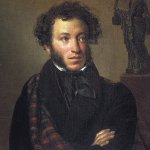Death Anniversary of Alexander Pushkin in Russia Date in the current year: February 10, 2026
 Alexander Pushkin is considered by many to be the greatest Russian poet and one of the founders of modern Russian literature, so it is not surprising that his death anniversary is a remembrance day in Russia. Although unofficial, it is observed by various cultural organizations on February 10.
Alexander Pushkin is considered by many to be the greatest Russian poet and one of the founders of modern Russian literature, so it is not surprising that his death anniversary is a remembrance day in Russia. Although unofficial, it is observed by various cultural organizations on February 10.Alexander Pushkin was born on June 6, 1799 (May 26 in the Julian calendar that was the official calendar in the Russian Empire) in Moscow. Both of his parents belonged to noble families. At age 12, he was sent to the prestigious Imperial Lyceum in Saint Petersburg.
While studying at the Lyceum, Pushkin published his first poem at the age of 15. By the time of his graduation in 1817, Pushkin’s poetic talent was widely recognized. He published his first narrative poem, Ruslan and Ludmila, in 1820. It stirred much controversy among critics about its style and subject. Pushkin’s next two Romantic poems, The Prisoner of Caucasus and The Fountain of Bakhchisaray, brought him critical acclaim.
Some of Pushkin’s works were influenced by his political stance (he was a liberal committed to social reform). Because of his political poems, Pushkin was exiled to his mother’s estate of Mikhailovskoye in 1824. In 1826, he returned to Saint Petersburg but was forbidden from traveling abroad.
Pushkin’s life was cut short by a fatal duel with the French military officer and politician Georges-Charles d’Anthès, who was rumored to have an affair with Pushkin’s wife Natalia Goncharova. The duel took place on February 8 (January 27 in the Julian calendar), 1837 at the Chornaya Rechka (Black River) in Saint Petersburg.
D’Anthès fired first, critically wounding Pushkin in the stomach. Pushkin’s shot only lightly wounded d’Anthès in the arm. Pushkin died of peritonitis two days later, on February 10 (January 29). He was buried near Pskov, beside his mother.
Many of Pushkin’s works are considered masterpieces that greatly contributed to the development of Russian literature. His poetic legacy includes dozens of short poems, as well as narrative poems and dramas. Pushkin’s most notable narrative poems include Ruslan and Ludmila, The Prisoner of Caucasus, The Fountain of Bakhchisaray, The Bronze Horseman, and Eugene Onegin (although Pushkin himself classified Eugene Onegin as a novel in verse).
Although Pushkin is best known as a poet, he also wrote prose; his prosaic works include a short story collection entitled The Tales of the Late Ivan Petrovich Belkin, the short story The Queen of Spades, and the novel The Captain’s Daughter.
Pushkin’s works were a source of inspiration for many composers including Mikhail Glinka, Pyotr Tchaikovsky, Modest Mussorgsky, Alexander Dargomyzhsky, Nikolai Rimsky-Korsakov, Sergei Rachmaninoff, and Igor Stravinsky, who created operas based on Pushkin’s narrative poems and dramatic works.
In addition to February 10, Alexander Pushkin is commemorated on June 6, which is his birth anniversary. Pushkin’s birthday is observed as Russian Language Day in Russia and the United Nations.
- Category
- Cultural Observances, Anniversaries and Memorial Days
- Country
- Russia
- Tags
- death anniversary of Alexander Pushkin in Russia, remembrance days in Russia, cultural observances, Alexander Pushkin